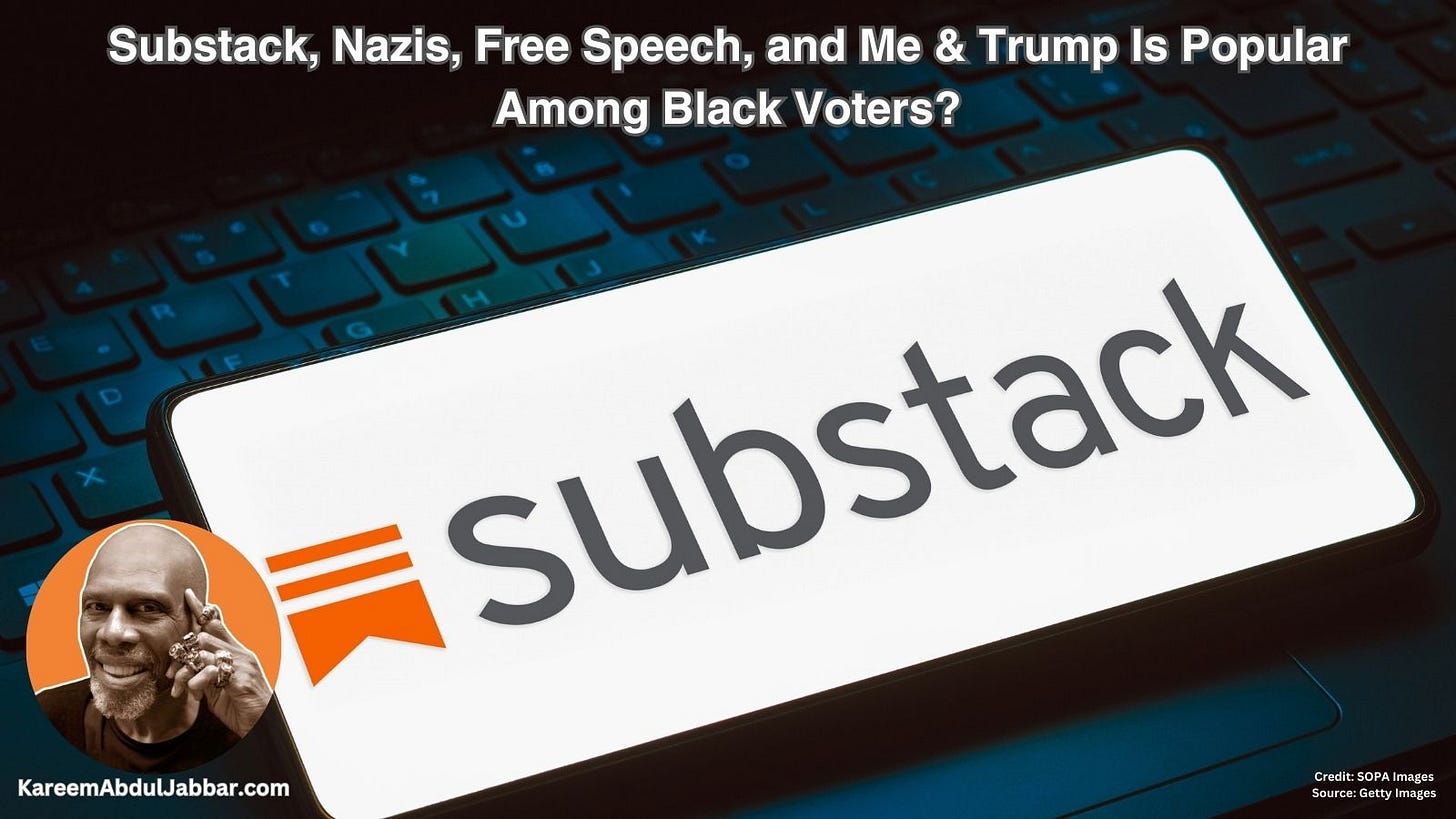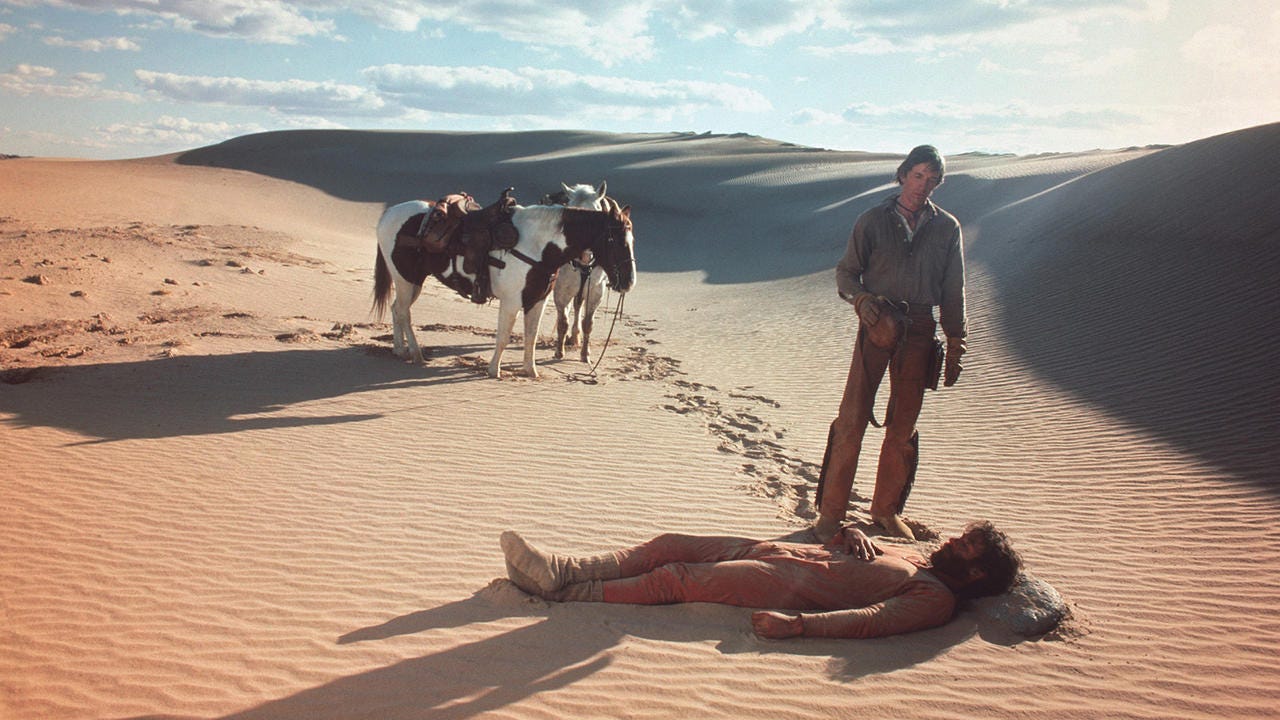Substack, Nazis, Free Speech, and Me & Trump Is Popular Among Black Voters?
Trump Says Americans Have No Choice But to Accept His Crimes, Lauren Boebert's Trifecta of Stupid: Climate Change, Abortion, Religion, Kareem's Movie Masterpiece: "Silverado," Elton John Sings
What I’m Discussing Today:
Kareem’s Daily Quote: This quote offers an approach to life that would make us all happier. But is it too hard to do?
Substack, Nazis, Free Speech, and Me: Substack has received criticism recently about its policies. I address the controversy.
Donald Trump Poised to Win More Black Votes Than Any Republican in History: This news item stunned me to the core. It’s like seeing Black apologists for slavery.
Trump posts all-caps rant telling people they 'JUST HAVE TO LIVE WITH' presidents who 'CROSS THE LINE': Trump makes a pitch for all-out dictatorship—and people are buying it.
Lauren Boebert Trifecta of Stupid: Climate change denial, crazy abortion claim, and arguing there should be no separation between Church and State.
Kareem’s Movie Masterpiece: Silverado is unlike any Western ever made. Stuffed with unique characters, thrilling action, droll dialogue, and plot surprises, this is still wonderfully original and entertaining nearly 40 years after its first release.
Kareem’s Video Break: Fred Astaire and Rita Hayworth dance with enough energy to power a fleet of EVs.
Elton John Sings: This may be the most amateurish music video ever made, starring the nerdiest dweeb ever seen. But the song soars.
Kareem’s Daily Quote
I always figure you might as well approach life like everybody's your friend or nobody is; don't make much difference.
Paden (Kevin Kline), Silverado
In this scene from Silverado, one of my favorite Westerns (which I discuss below in Kareem’s Movie Masterpiece), Kevin Kline plays a reformed outlaw who has been robbed, stripped, and left to die in the desert. He describes how he got taken advantage of: “Me, I'm riding along, minding my own business. Four cowboys come by and we decide to ride together for a while, friendly as can be…We get out in the middle of that frying pan and suddenly everybody's pointing their gun but me. I guess they admired my horse.” The quote is his explanation for why he was taken advantage of.
I saw the movie in 1985 when it was released and that line has stayed with me ever since. I admire a person who chooses to go through life as if everybody’s a friend. That commitment to optimism has eluded most of us, even as we long to be that kind of person.
The interesting line in that quote is “don’t make much difference.” He’s saying that his choice isn’t necessarily the right one or even the best one, but it suits him. It’s an admonishment not to foist your moral choices on others by proselytizing like a missionary with a quota for conversions to their faith. Instead, he’s echoing poet John Milton: “The mind is its own place and, in itself can make a heaven of hell or a hell of heaven.” We have no control over the way the world works but we are responsible for choosing how we perceive the world—and the actions that result from that perception.
I’m not evolved enough, or brave enough, to treat all strangers as if they are my friends. In part, celebrity makes that more challenging because more people approach me at inconvenient times. But that quote has encouraged me to be much more open with strangers, and more trusting, and that has made me feel much more optimistic.
For me, heaven is a place where everyone treats each other with love and respect and no one tries to exploit anyone else. I want that heaven here and now. Each time I treat people as if they were my friends, I get a little glimpse of that heaven—and am inspired to do my part to make it happen.
Substack, Nazis, Free Speech, and Me
This question of the parameters of free speech is especially important to me because, for the past three years, I’ve been writing a newsletter on the Substack platform. Without free speech, my newsletter would not be possible. I started it as a natural evolution of my years as an activist as well as the reality of my age. To me, at its best, free speech is an exchange of researched and reasoned ideas. At its worst, it is vitriolic, ill-informed, and irrational ramblings. But the thing about free speech is that there is no requirement that you are reasonable. Which is where I come in. I started a Substack newsletter to promote reasoned discourse about the intersection of social and political issues with popular culture.
Substack describes itself as a Netflix for writers, meaning they aren’t responsible for the content, merely for providing a centralized site for writers across the political spectrum to engage in free speech. They have built a virtual open-mike stage. All we have to do is sign up and perform.
Substack has over 50,000 publications with 35 million active subscribers, including two million paid subscribers. Writers include historian Heather Cox Richardson, prize-winning writers George Saunders, Salman Rushdie, Roxane Gay, and Chuck Palahniuk, filmmaker Michael Moore, musician Patti Smith, and many respected journalists. We all face the responsibility of knowing that our celebrity supports the existence of Substack and by extension its policies.
Substack has come under scrutiny for allowing newsletters that promote hate speech, Nazis, and white supremacy. Substack responded to the criticism by issuing a statement: “I just want to make it clear that we don’t like Nazis either — we wish no one held those views. But some people do hold those and other extreme views. Given that, we don’t think that censorship (including through demonetizing publications) makes the problem go away — in fact, it makes it worse.” According to Substack, only six publications out of the 50,000 with a total of 29 paying subscribers have been identified by Substack as violating their terms of service, with one being taken down. Nevertheless, many Substack writers disagreed with Substack’s policy, with hundreds of newsletter writers signing a letter against their policy. Another 100 signed a letter in support of Substack. A few left the site, including high-profile Platformer, a tech newsletter.
Substack would like to think of itself as nothing more than a virtual bookstore that carries volumes by authors of all points of view. The public could then decide whether the store should carry the book and whether particular voices were valuable enough to keep listening to, by subscribing or not. As capitalists, we should let the marketplace decide.
Sounds good when scrawling out a manifesto at 3 a.m. on the back of a cocktail napkin right before last call. But it’s naïve and woozy thinking not supported by history, facts, or practicality. Continuing with the bookstore metaphor: one browses the titles, purchases a book, takes it home, and reads it over a period of time that allows considered reflection on the content. Social media is often less about reflecting on content and more like a Real Housewives-style shouting match, a verbal brawl devoid of reason intended to inflict maximum emotional harm. Except that, because the words are delivered at 186,000 miles per second to millions, massive physical harm against innocent people can be encouraged.
If I owned a bookstore, I wouldn’t carry Nazis’ words because they don’t add anything to the debate, yet they encourage violence among people who might just follow through. I’m not saying they shouldn’t be allowed to say whatever they want, but I don’t have to promote them—or others with similar views. My bookstore, my rules. Substack has the same responsibility to gatekeep against hate speech.
I, along with others, have communicated our concerns directly with the Substack organization and they have made changes. They have removed some offensive newsletters and have begun more intense scrutiny of others. Is it perfect? Not yet. But good-faith efforts have been made and more changes are coming.
One of the signs of bad scriptwriting is often shown in young adult shows in which a teenager gets into an argument with a friend or parent, shouts something hurtful, and then storms out of the room. In real life, those heated conversations don’t conveniently end to allow for a commercial break. The shoutee follows the shouter and the argument continues down the hall, into the living room, into the kitchen, and the car. Real-life disagreements are messy, prolonged affairs that require time and effort on both sides. Door slamming should be a last resort. It is not my intention to punish Substack for its lapses but to work with them to change their policies.
In my research for a book I’m currently writing about protest movements from the sixties to the present, I’ve come across some racist and dismissive past writing in publications I admire from The New York Times to Time magazine. I have written for both those publications because they have changed, and evolved. YouTube has some racist, misogynistic, homophobic content, but I still watch YouTube videos. Amazon, Bookshop.com, and Barnes & Noble carry books by Donald Trump, a rapist, a supporter of Nazis and white supremacists, fraudster, insurrectionist, and a person who has done massive harm to our democracy, much more than the handful of Nazis on Substack. Yet, I still shop at all three of those places.
It’s important to note that without the public protest of these sites, Substack might never have addressed the issue. This is a wonderful example of how effective modern protest movements that originate and are carried out almost exclusively online can be highly effective in addressing important social issues.
Bottom line: I’m not shouting an insult, then slamming the door and storming out of the room. Not yet. I first want to give people the chance to change. As long as I continue to see a commitment from Substack to listen, to evolve, I’ll stay.




